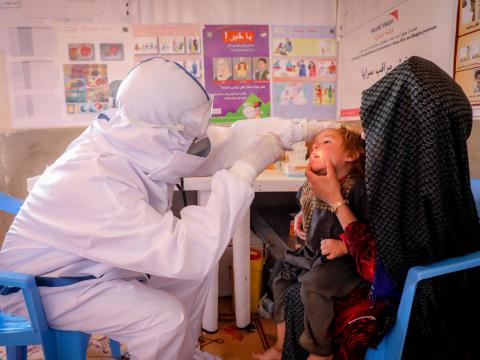World Vision statement on the resumption of operations in Afghanistan

World Vision Afghanistan’s operations resumed on Sunday (5th September) – after weeks of suspension - with the launch of mobile health and nutrition and food distribution activities in the west of the country.
The mobile clinics are aimed at feeding malnourished children and dealing with urgent health problems. In total, six mobile health teams (four in Herat and two in Ghor) restarted, along with a distribution of World Food Programme (WFP) food in Ghor.
The aid agency’s mobile health team services families displaced by conflict from other parts of western Afghanistan, and the vulnerable communities that are hosting them. They are the first point of contact for health issues that may require immediate or further treatment.
World Vision’s National Director Asuntha Charles said: “We are relieved to get back to work after weeks of uncertainty, distress and conflict. We are now focused on rebuilding our operations. We need to get staff back to work, get our systems operational, re-equip our mobile health teams with pharmaceuticals and PPE (personal protective equipment), and put in place staff to run our WFP food assistance operations.”
The child focussed NGO’s priority is to ensure malnourished children are placed on feeding programmes immediately. It is also partnering with World Food Programme to distribute food in Badghis and Ghor provinces. At present the team is involved in the preparatory works needed to expand field distributions.
More than 18 million Afghan people - at least half the country - need humanitarian assistance following a severe drought, conflict, displacement and recent impacts of COVID-19. However adequate funding is not currently available to meet need. The UN’s $1.3 billion response plan is currently only 39% funded. A new UN flash appeal has been launched, calling for an additional $193 million. World Vision’s US$15m response aims to support one million people – half of them children. So far, just over $1m in has been pledged of the total $5.7m so far committed by donors.
World Vision is in negotiations with the Taliban in the provinces where they work to ensure staff safety and access, with particular focus on the safety of female humanitarian workers and beneficiaries. The aid agency is also is closely following conversations between UN, international government representatives and the Taliban leadership of Afghanistan. The outcome of those conversations will dictate how quickly aid agencies can respond the severe hunger crisis that is threatening the lives of 2.7 million Afghan people.
As a humanitarian agency World Vision believes in the rights of women to work, just as men have them. Women are an essential part of the workforce if World Vision is to do effective programming with vulnerable women and girls in communities. World Vision is standing together with the humanitarian community to insist that women be part of the workforce and that programmes will not start without assurances that this is the case. The only exception is where programmes are life-saving. No child can be allowed to die. World Vision has assurances that the mobile health and nutrition clinics, and the food distribution work in Ghor can be staffed by women and that women can attend as beneficiaries.
On Sunday, UNOCHA’s chief Martin Griffiths, met with Mullah Baradar, the leader of the Taliban in Kabul, where he highlighted the impartial role of agencies in delivering humanitarian assistance and protection. He also committed the international community to meeting Afghanistan’s significant and urgent needs. The Taliban assured him of their cooperation.
Asuntha Charles, who also attended an online meeting that with Griffiths held with INGOs, said: “It is encouraging that the Taliban are inviting humanitarian agencies to continue their work, with the involvement of both men and women. At this critical time, it is more important than ever that we continue to work together to uphold the rights of all people in Afghanistan, including their right to life-saving aid. Many agencies have already worked in parts of the country that were previously under the influence of the Taliban, so they know our work and who we are.”
ENDS.